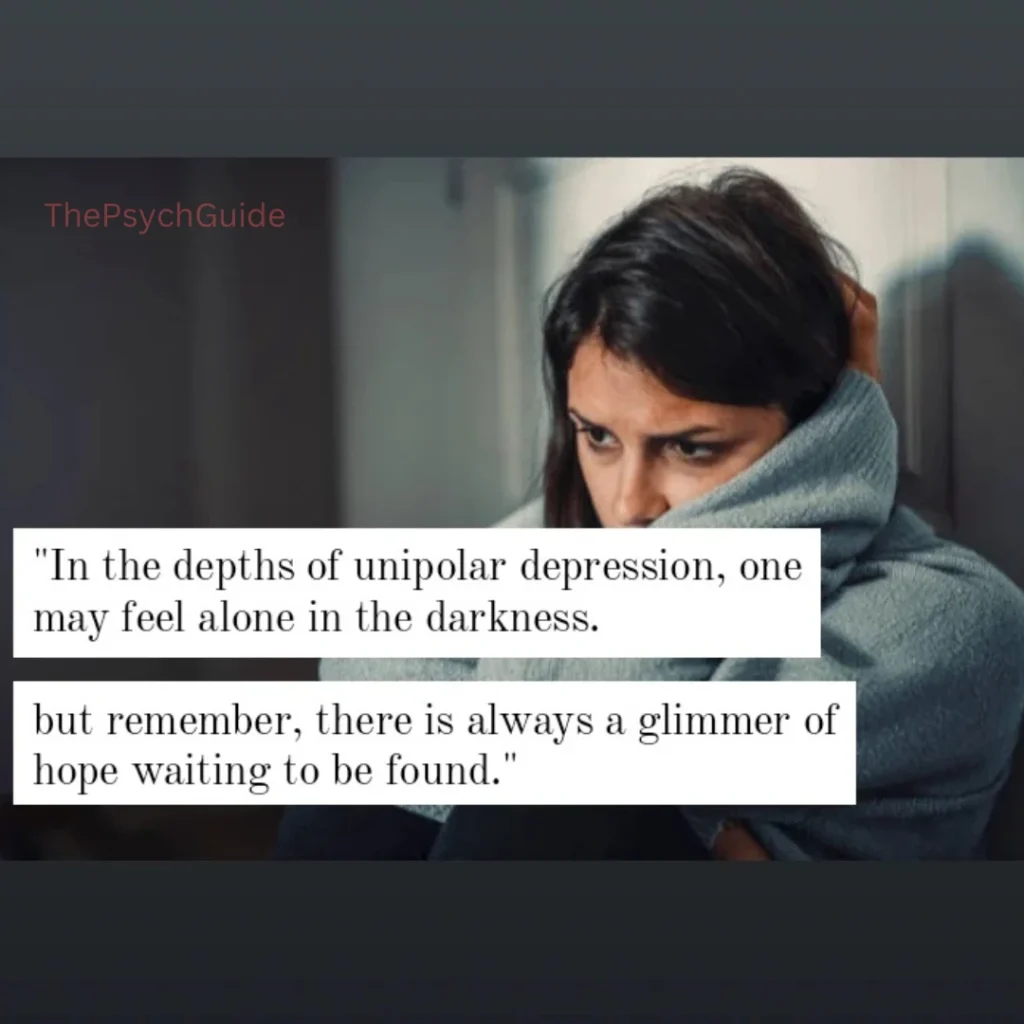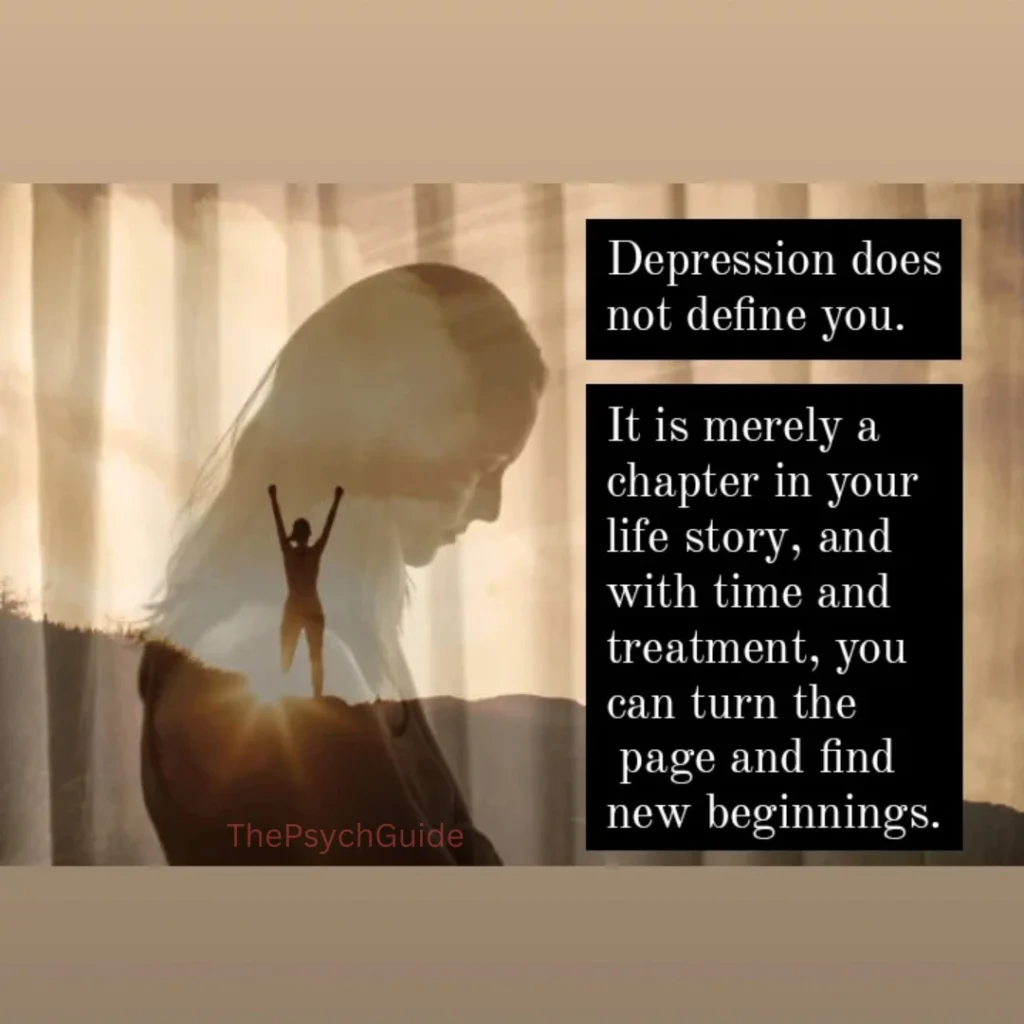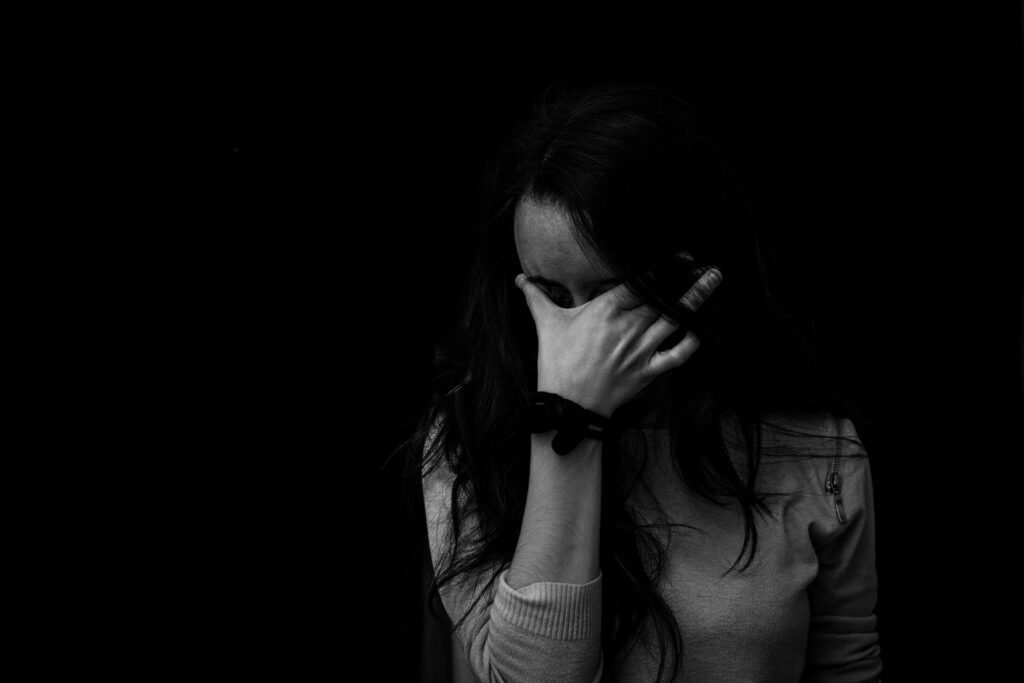Unipolar depression, also known as Major Depressive Disorder (MDD), is a serious mood disorder that significantly affects individuals’ lives. Some common symptoms of unipolar depression include persistent feelings of sadness and a lack of interest in engaging with the world around them.
According to report of National Institute of Mental Health, approximately 7% of adults in the U.S. have experienced an episode of unipolar depression. Unlike bipolar depression, which involves alternating mood states, unipolar depression is focused on the negative emotions and feelings experienced by those affected. Loss of interest in previously enjoyed activities, difficulty performing daily tasks, and even thoughts of suicide may accompany this disorder.
Let’s explore symptoms of unipolar depression in detail along with its causes and treatment.
It’s important to note that “unipolar” is not a specific diagnosis or term used in clinical psychology or psychiatry. The term typically used to describe a persistent low mood is “Major Depressive Disorder” (MDD).
Table of Contents
ToggleSymptoms of Unipolar depression
Here’s an explanation of each symptom associated with depression:
1. Feelings of worthlessness or guilt
Individuals with depression often experience an overwhelming sense of worthlessness or excessive guilt. They may feel unfit for love, happiness, or success, even in situations where such feelings are not warranted.
2. Hopelessness concerning the future
Depression can lead to a pervasive sense of hopelessness, where individuals struggle to fantasize about a positive or fulfilling future. They may feel trapped in their current circumstances and believe that things will never improve.
3. Inability to derive pleasure from once-enjoyed activities, hobbies, or relationships
A hallmark symptom of depression is the inability to experience pleasure or derive satisfaction from previously enjoyable activities. This loss of interest can include hobbies, social interactions, and even close relationships.
4. Difficulty with clear thinking and decision-making
Depression can impair cognitive function, leading to difficulties in thinking clearly and making decisions. Individuals may find it challenging to concentrate, have poor memory recall, and struggle to process information effectively.
5. Cognitive difficulties often referred to as “brain fog”
Many individuals with depression describe experiencing a cognitive fog or cloudiness, commonly known as “brain fog.” This can manifest as difficulties with concentration, attention, and mental clarity.
6. Thoughts of self-harm or suicide
Depression can bring about intense feelings of despair and a sense of being trapped, leading to thoughts of self-harm or suicide. It is crucial to take these thoughts seriously and seek immediate help or support.
7. Changes in appetite, including overeating or loss of appetite
Depression can disrupt one’s eating patterns, leading to significant changes in appetite. Some individuals may experience an increase in appetite, resulting in overeating and weight gain, while others may lose their appetite and experience weight loss.
8. Suicidal thoughts
Suicidal thoughts can be a symptom of unipolar depression, a mental health condition characterized by persistent feelings of sadness and hopelessness. In the depths of depression, individuals may perceive themselves and the world around them in a negative light, leading to thoughts of suicide as a way to escape their emotional pain. It is crucial to take these thoughts seriously and seek immediate professional help. Mental health professionals can provide appropriate support and treatment to address the underlying causes of depression and help individuals find hope and healing. Additionally, helplines and support networks are available to offer immediate assistance and connect individuals to the resources they need.
9. Disturbances in sleep patterns, such as insomnia or excessive sleep
Depression commonly affects sleep patterns. Some individuals may struggle with insomnia, finding it difficult to fall asleep or stay asleep throughout the night. Others may experience excessive sleepiness, spending more time sleeping than usual.
10. Persistent feelings of low energy
Individuals with depression often report persistent feelings of fatigue and low energy. This can make even simple tasks feel overwhelming and exhausting.
11. Psychomotor agitation and Retardation
In unipolar depression, some individuals may experience psychomotor agitation or retardation. Psychomotor agitation involves an increase in physical and mental activity, leading to restlessness, fidgeting, rapid speech, and racing thoughts. On the other hand, Psychomotor Retardation . involves a slowing down of physical and mental processes, resulting in slowed movements, decreased energy, and difficulties with concentration and decision-making. These symptoms reflect changes in motor behavior and can vary in intensity among individuals. It is important to seek professional help for a comprehensive evaluation and appropriate treatment if these symptoms are present, as they can contribute to the overall impact of depression on a person’s functioning and well-being.
After knowing about symptoms of unipolar depression, lets talk about its causes.

Causes of Unipolar Depression
Unipolar depression, also called Clinical Disorder, has various factors that can contribute to its development. Although the exact causes are not fully understood, several important elements have been identified:
Biological Factors:
Chemical imbalances in the brain, particularly in neurotransmitters like serotonin and norepinephrine, may play a role in unipolar depression. Genetics also have an influence, as individuals with a family history of depression are more likely to experience it.
Environmental Factors:
Certain life events and situations, such as trauma, loss of a loved one, relationship problems, financial difficulties, or chronic stress, can trigger or worsen symptoms of unipolar depression. Difficult childhood experiences or exposure to adversity can also increase the risk.
Psychological Factors:
Personal traits like having a negative mindset, low self-esteem, or a tendency to dwell on negative thoughts can contribute to the development of unipolar depression. People with poor coping skills or a history of other mental health disorders are also more vulnerable.
Medical Conditions:
Certain medical conditions, such as chronic pain, hormonal imbalances, or neurological disorders, can be linked to a higher risk of unipolar depression. Substance abuse or dependence can also make the condition more likely or more severe.
Treatment of Unipolar Depression
Following are some of the options to cope with symptoms of unipolar depression:
- Psychotherapy (such as cognitive-behavioral therapy) to address negative thought patterns and develop coping skills.
- Medication is prescribed by healthcare professionals, to balance brain chemicals and alleviate symptoms.
- Adopting a healthy lifestyle, including regular exercise, a balanced diet, sufficient sleep, and stress management techniques.
- Building a support network of trusted friends, family, or support groups.
- Engaging in self-care activities, practicing self-compassion, setting boundaries, and pursuing enjoyable hobbies.
- Incorporating mindfulness and meditation practices to enhance self-awareness and reduce stress.
- Regular therapy sessions and follow-ups with healthcare professionals for ongoing support and adjustment of treatment plans.

FAQ’s
How can I determine if I have unipolar depression?
The primary diagnostic criteria for unipolar depression involve experiencing a persistently low mood for a minimum of two weeks. For instance, you may feel constantly sad, irritable, or generally dissatisfied with life, and these emotions typically do not improve even when your circumstances change or positive events occur.
What are the causes of unipolar depression?
Unipolar depression can be caused by a combination of environmental, psychological, and biological factors. Biologically, it may result from a combination of stress, a family history of depression or mental illness, and hormonal imbalances that increase the risk of developing unipolar depression.
What does unipolar behavior mean?
The term “unipolar” refers to the concept that there is only one extreme “pole” or side to your abnormal mood state. In contrast, bipolar depression involves two poles: mania and depression. If you are uncertain about which type of depression you are experiencing, it is advisable to consult with your doctor, psychiatrist, or mental health counselor rather than self-diagnosing.
Is unipolar depression rare?
While relatively uncommon, cases of unipolar mania or mild depression with mania have been observed. Previous research suggests that these conditions are more frequently observed in men of color, with an earlier onset of illness and lower rates of comorbidity with anxiety disorders.
Is unipolar depression worse than bipolar depression?
It is not possible to definitively determine which form of depression is worse. Both major depression and bipolar depression present unique challenges for management. However, bipolar depression tends to occur in episodic patterns, which can be stressful for both the individual and those around them, distinguishing it from unipolar depression.
Are unipolar depression and MDD the same thing?
In simple terms, unipolar depression is a term used interchangeably with Major Depressive Disorder (MDD), also referred to as Clinical Depression. This mood disorder is characterized by persistent feelings of sadness or a diminished interest in activities that were once enjoyable activities.
Conclusion.
In conclusion, the symptoms of unipolar depression are diverse and can have a profound impact on an individual’s emotional well-being, daily functioning, and overall quality of life. Persistent feelings of sadness, lack of interest, hopelessness, and diminished pleasure in once-enjoyed activities are key indicators of this common mental health condition.
Physical symptoms such as changes in appetite and sleep patterns, fatigue, slowed movements, or restlessness, and cognitive difficulties like difficulty concentrating or experiencing “brain fog” further contribute to the complexity of unipolar depression. Additionally, the presence of intrusive thoughts involving self-harm or suicide highlights the severity of this condition and the urgent need for professional help and support.
It is crucial to remember that unipolar depression is not a temporary or fleeting sadness but a persistent and debilitating condition that requires proper diagnosis and treatment. Seeking assistance from healthcare professionals, such as therapists, psychiatrists, or counselors, is essential to developing a treatment plan that the individual needs.
They understand and recognize the symptoms of unipolar depression, both individuals experiencing them and those around them can provide support and encouragement.
Ultimately, with the right treatment, including therapy, medication, and a strong support network, individuals with unipolar depression can find relief from their symptoms, regain their zest for life, and work towards improved mental well-being.

